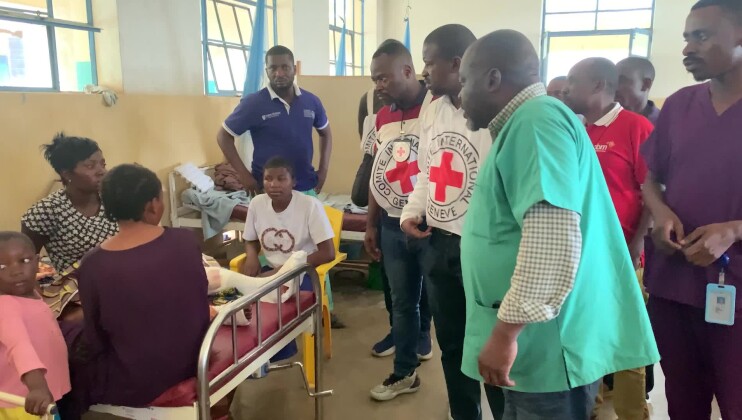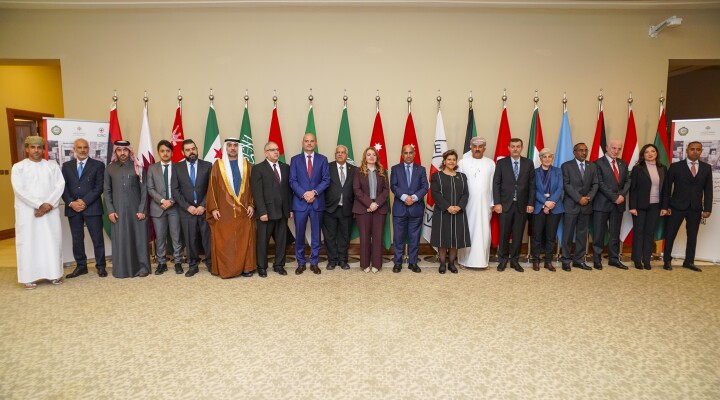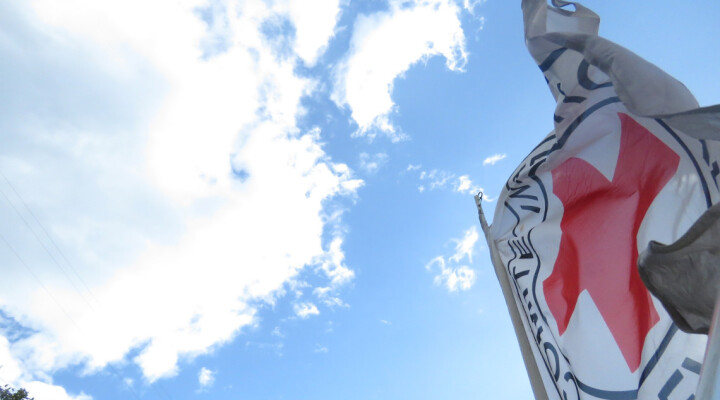Somalia: Climate change and conflict threaten herders
Conflict and the growing climate crisis are pushing herders in Somalia to abandon their way of life, the International Committee of the Red Cross (ICRC) has warned.
Erratic weather patterns, droughts and floods have taken their toll on Somali pastoralists, while conflict, COVID-19 and the recent locust infestations have made matters worse.
Stark new footage from the East African nation lays bare the struggles facing herders. Ahmed Mohamud, a herder, said he has lost 50 of his 70 camels while other herders have lost all their livestock.
“There’s no food. The ground is dry,” he said. “This country is known for its refugees. If you lose your animals, you sign up as a refugee, that's what we say. So, there are many people who lost their animals and signed up as refugees.”
Dwindling herds have become commonplace as vegetation, a source of food for the animals, becomes harder to find.
The recurrent nature of climatic shocks, such as droughts and floods, mean herders have little chance to recover. The instability created by conflict further weakens their ability to adapt and find alternative grazing areas.
Mohamed Hassan Gure, another herder, said: “The latest drought, 2021, is the one that destroyed the animals. Before they recovered from the previous drought they were hit by others. Like the locusts. The locusts ate the pastures.
“So the animals did not get anything to eat and that is how they died. There was nothing to give them. They didn't have anything to feed on. We were left with 50 animals. Out of the 50, 30 were killed by the rains. Now 20 are left.”
He added: “Only God knows, but we wonder whether our way of life is in danger. If the droughts continue and the animals get fewer, this way of life is in real danger.”
The frequency of climate-related crises in Somalia is increasing. More than 30 climate-related hazards, including droughts and floods, have hit the country since 1990 – a threefold increase compared to similar events between 1970 and 1990 (OCHA). The recurrent nature of such events makes recovery difficult for communities.
Somalia is ranked as one of the most vulnerable countries to climate change by the ND-GAIN Country Index when it comes to its ability to improve resilience.
Three decades of conflict have weakened the country’s institutions and left some 2.9 million people internally displaced. Competition over scarce natural resources can also increase tensions leading to violence.
“Somalia is a perfect case of [the] disastrous consequences of the combination between climate change and conflict. And how climate change and conflict are working together to worsen an already disastrous humanitarian situation,” said Abdallah Togola, who heads up ICRC’s economic security program in Somalia.
“These extreme weather events due to global warming, climate change, are droughts, floods and cyclones. All these factors now are more frequent, first, and are worse in terms of intensity.”
The ICRC has supported more than 11,000 families who were left in a precarious situation following the prolonged dry season in Somalia this year.
As part of its support, cash grants totaling nearly CHF 900,000 have been sent to these families to help them cope with the harsh conditions and loss of livelihoods.
Note to editors - Available for interview:
Abdallah Togola, ICRC Economic Security Coordinator (Based in Nairobi, Kenya) in English & French
Abdirahman Mohamed Abdullahi, ICRC Communication Officer (Based in Garowe, Somalia) in English
Established in 1863, the ICRC operates worldwide helping people affected by conflict and armed violence and promoting the laws that protect victims of war. A neutral, independent and impartial organization, its mandate stems from the Geneva Conventions of 1949.
In Somalia, the ICRC works with the Somali Red Crescent Society to help people affected by conflict and natural disaster. Click here to find out more
For further information, please contact:
Abdikarim Mohamed, Nairobi, +254 770 171 756, mabdikarim@icrc.org
Alyona Synenko, Nairobi, +254 716 987 265, asynenko@icrc.org
SHOTLIST
Location: Mudug region Somalia
Length: 8’ 52’’
Camera: Anisa Hussein Dahir
Editor: Abdikarim Mohamed
Filming Date: 19 July 2021, 20 July 2021Copyright: ICRC access all
On Screen Credit: ICRC or logo
00:00:00:00 - 00:00:07:08 Overhead shot of bones
00:00:07:08 - 00:00:12:08 Close-up of bones
00:00:12:08 - 00:00:37:25 Shot of herders watering the camels in Tula Qorah
00:00:37:25 - 00:00:59:19 SOUNDBITE Ahmed Mohamud, herder
“We lost 50 animals. They were 70. Fifty died and we were left with 20 Camels! Some no longer have livestock. They lost them all. That's how it is and we are surviving.”
00:00:59:19 - 00:01:21:11 Shot of Mohamed Hassan Gure's home in tula Qorah
00:01:21:11 - 00:01:32:29 Different angle of Momed Hassan's home in Tula Qorah
00:01:32:29 - 00:01:40:12 Wide shot of Mohamed Hassan Gure's home
00:01:40:12 - 00:01:47:13 Close-up shot of sauce pan on the fence
00:01:47:13 - 00:02:17:28 SOUNDBITE Mohamed Hassan Gure, herder
“The latest drought, 2021, is the one that destroyed the animals. Before they recovered from the previous drought, they were hit by others. Like the locusts. The locusts ate the pastures. So animals did not get anything to eat and that is how they died. There was nothing to give them. They didn't have anything to feed on. We were left with 50 animals. Out of the 50, 30 were killed by the rains Now 20 are left.”
00:02:17:28 - 00:02:33:26 Goat grazing outside Mohamed Hassan Gure's home
00:02:33:26 - 00:02:38:13 Mohamed Hassan dress the goat kids from their pen (thorn bush)
00:02:38:13 - 00:02:47:13 Mohamed Hassan outside his home with his goats
00:02:47:13 - 00:03:16:14 SOUNDBITE Ahmed Mohamud, herder
“The droughts are next to each other. They are very close to each other and sometimes... When we stay a year the following year we have to brace ourselves. When we are in the dry season we brace ourselves. We give them food when things get bad. We put the food on the ground for them to eat. We beg for the food from people. We prepare food for them. There's no food. The ground is dry.”
00:03:16:14 - 00:04:51:01 SOUNDBITE Abdallah Togola, in charge of Economic Security program, ICRC, Somalia
“Somalia is a perfect case of disastrous consequences of the combination between climate change and conflict. And how climate change and conflict are working together to worsen an already disastrous humanitarian situation. We have to recall that since three decades or more Somalia is in civil war, in conflict. This conflict has displaced thousands, hundred of thousands of people. But now, Somalia is located in East Africa, the Horn of Africa, that is known to be in terms of global warming, 2.5 times faster than the rest of the world. This has brought extreme weather events. These extreme weather events due to global warming, climate change, are droughts, floods, and cyclones. All these are factors now are more frequent, first and are worse in terms of intensity in Somalia. ”
00:04:51:01 - 00:05:11:23 Pan shot of water in a rain water catchment (berkad) to herders watering their camels in Tula Qorah
00:05:11:23 - 00:05:25:00 Shot of camels drinking water
00:05:25:00 - 00:05:37:15 Camels scramble for space to drink water
00:05:37:15 - 00:05:52:04 SOUNDBITE Mohamed Hassan Gure, herder
“The rural people always depended on the animals. If they lose the animals there is nothing to depend on. If your animals die, you die with them. You can't survive without your animals. He can't survive.”
00:05:52:04 - 00:06:15:25 SOUNDBITE Ahmed Mohamud, herder
“There is someone who had a lot of animals, all kinds of animals, who is now just sitting. Trying to do something else. This country is known for its refugees. If you lose your animals, you sign up as a refugee, that's what we say. So there are many people who lost their animals and signed up as refugees.”
00:06:15:25 - 00:06:28:21 Mohamed Hassan Gure walking in the fields outside his home
00:06:28:21 - 00:06:38:10 Goats grazing in Tulo Qorah as Mohamed Hassan watches over them
00:06:38:10 - 00:06:57:14 SOUNDBITE Mohamed Hassan Gure, herder
“Only God know, but we wonder whether our way of life is in danger. If the droughts continue and the animals get fewer this way of life is in real danger. That is our fear.“
00:06:57:14 - 00:07:03:06 Goats grazing
00:07:03:06 - 00:07:08:27 Shot of dry and rocky field in Tula Qorax
00:07:08:27 - 00:08:51:26 SOUNDBITE Abdallah Togola, in charge of Economic Security program, ICRC, Somalia
“This year has been particularly difficult because it is a consequence of 2020 exception. You have to know that the conflict-climate change combination, having worsened by an exceptional situation of coronavirus. When coronavirus came, the first consequence was the closure of the borders. And Somalia depends a lot in terms of imports of goods but also exporting.”



